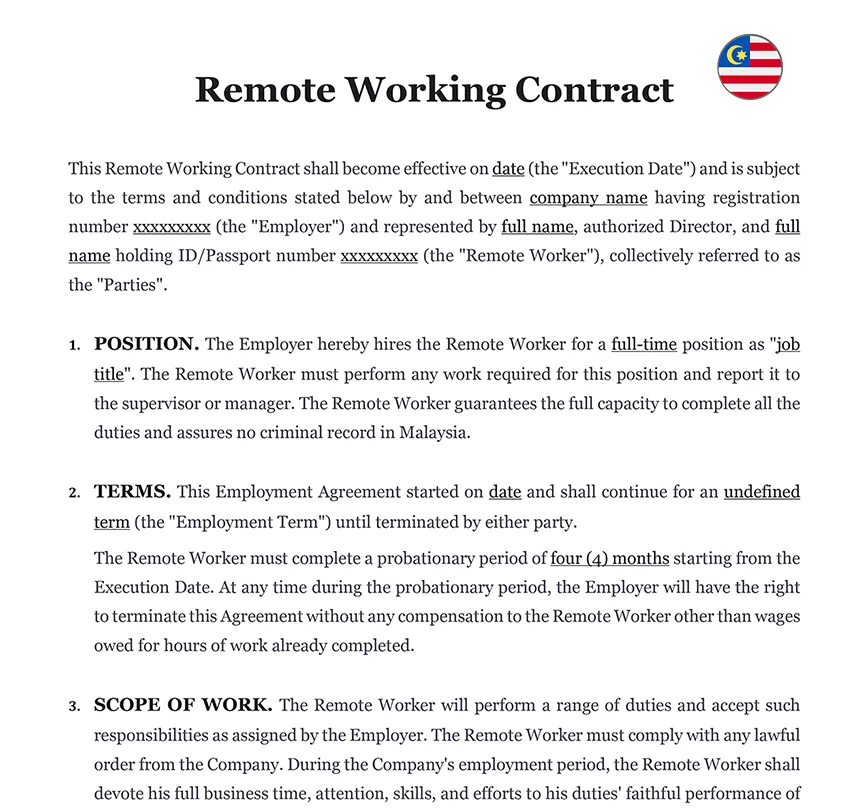Ready to use legal template
Drafted by experienced lawyers
Chinese-English translation
Ready to use legal template
Drafted by lawyers
Chinese-English translation
Learn more about Remote Working Contract in China
A Remote Working Contract is a formal agreement between an employer and employee outlining the terms and conditions for remote work. This contract defines the expectations, responsibilities, and rights of both parties, ensuring clear communication and legal protection. In today’s increasingly digital workforce, remote work agreements are crucial for setting boundaries regarding work hours, confidentiality, equipment use, and performance standards. A well-structured remote working contract provides clarity on issues like salary, benefits, and data security, offering peace of mind to both the employer and employee. With China’s growing trend towards flexible working arrangements, it is essential to establish a clear framework for remote work. Download our Remote Working Contract, easy to edit in Word format and drafted by lawyers in English and Mandarin, to ensure your remote work agreements are fully compliant and legally sound.
Table of contents
-
What is a Remote Working Contract?
-
What is included in this Remote Working Contract?
-
How is a Remote Working Contract different from an employment contract?
-
Is a Remote Working Contract legally binding in China?
-
Can an employer terminate a Remote Working Contract?
-
Do I need to provide equipment for employees working remotely?
-
What are the tax implications for employees under a Remote Working Contract?
-
Are remote employees entitled to the same benefits as office-based employees?
-
How does remote work affect employee health and safety obligations?
What is a Remote Working Contract?
A Remote Working Contract is a formal agreement between an employer and an employee that outlines the terms and conditions for working remotely. This contract defines the expectations and responsibilities of both parties and provides clarity on critical areas such as working hours, confidentiality, equipment use, and performance standards. It ensures that both the employer and employee understand their respective rights and obligations in a remote work setting. In China, as the workforce becomes more digitally oriented, a remote working contract is crucial to address the specific legal requirements of remote work. It helps protect both parties legally and establishes a clear understanding of working relationships when the employee is not physically present at the company’s office.
What is included in this Remote Working Contract?
A well-drafted Remote Working Contract typically includes several key clauses to ensure a comprehensive and clear agreement between the employer and employee. These clauses typically cover the following aspects:
| ➤ Position: The employee’s role and duties, specifying the job title and the capacity in which the employee will be performing their tasks. |
| ➤ Terms: Includes the start date of the contract, probationary period, and conditions for termination by either party in accordance with Chinese labor law. |
| ➤ Scope of Work: Outlines the specific tasks and responsibilities expected of the employee working remotely, ensuring alignment with the employer’s expectations. |
| ➤ Work Schedule: Defines the employee’s working hours and any flexibility provisions that might exist, ensuring compliance with labor laws on working hours and rest periods in China. |
| ➤ Salary: Specifies the remote worker’s salary, payment frequency, and adherence to Chinese salary regulations. |
| ➤ Benefits: Covers entitlements like bonuses, commissions, social security, and insurance, ensuring the employee’s benefits are in compliance with China’s social security and tax system. |
| ➤ Performance Evaluation: Describes the periodic evaluations of the employee’s work performance, which are critical for career progression and adjustments in compensation. |
| ➤ Communication and Collaboration: Sets out how the employee will communicate and collaborate with the team, including the tools and methods used, ensuring smooth remote operations. |
| ➤ Equipment and Technology: Establishes which party is responsible for providing the necessary equipment and the security measures in place to comply with Chinese cybersecurity regulations. |
| ➤ Data Security and Confidentiality: Outlines the employee’s responsibility to protect sensitive company data and follow the country’s data protection and privacy laws. |
| ➤ Vacation: Details the employee’s entitlement to vacation leave, sick leave, and other types of leave, ensuring compliance with China’s leave policies. |
| ➤ Expenses: Defines how work-related expenses will be reimbursed and the process for approval, in line with Chinese tax and corporate policy. |
| ➤ Termination: Details the terms under which either party can terminate the contract, including notice periods, conditions for termination, and considerations such as force majeure. |
| ➤ Entire Agreement: Specifies that this contract represents the entire agreement between the parties and supersedes any prior agreements. |
| ➤ Governing Law: Specifies that the agreement is governed by the laws of the People’s Republic of China, ensuring compliance with local labor laws and legal frameworks for dispute resolution. |
Overall, it promotes a mutually beneficial and productive remote work environment by setting clear expectations and protecting the interests of both parties involved.
How is a Remote Working Contract different from an employment contract?
1. Key Differences Between a Remote Working Contract and a Standard Employment Contract
A Remote Working Contract differs from a standard Employment Contract primarily in its focus on the terms specific to remote work. While a standard employment contract covers broader employment terms, such as job title, salary, and general duties, a remote working contract explicitly outlines the conditions for remote work, including critical aspects like:
| ➤ Work schedule flexibility |
| ➤ Equipment and technology provisions |
| ➤ Communication protocols |
| ➤ Data security measures |




